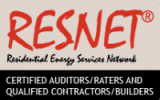The amount of available information about energy efficiency can become confusing. Should we be accepting everything that we hear about becoming more energy efficient as true? Or should we approach what we hear and see with a certain amount of skepticism until we can verify it?
It doesn’t appear to be that people are intentionally circulating inaccurate information about how to be more energy efficient. Some of the information that you find may be just a little misguided. We are going to clear up some of your questions today be debunking five of the most common myths about energy efficiency.
1) Running a Fan in an Empty Room Helps Cool the Room or the House
One of the first myths is leaving a fan on in an empty room will keep it cool. You can become more energy efficient right now by shutting those fans off. If a fan is running in the room and no one is in there to feel the breeze of the fan, that fan is doing nothing to keep that room or your home cooler. The purpose of fans is not to cool a room, but to only blow air over the people who are in a room to keep them cooler. A simple way to remember this myth is “rooms don’t feel hot, but people do.” By shutting off the fans in your house, you can easily save money on your electric bill.
2) Closing the Vent Saves Money
For most of us, it would seem like common sense that if we shut the vents that go to extra rooms in our homes that aren’t used that often, that we would be saving some money on heating and cooling cost.
As great as that may sound, that is not the case. By closing vents in your house, you can throw off how your heating, ventilation, and air conditioning system process airflow. The system is trying to achieve balance in ventilating your home, and when you shut a vent, you hinder its capabilities to balance out the air or heat. By closing vents, you actually make your system work even harder to balance out and change the temperature of your home.
It will work a lot more efficiently if you leave all of your vents open, and adjust your thermostat as you would normally.
3) Hand Washing Saves Water
Another common energy efficiency myth that gets passed around all of the time is that hand washing saves more water than using your dishwasher. Regarding which is better for energy efficiency, using the dishwasher is more efficient. When you are hand washing dishes, the constant running of water in the sink while you have to scrub down each dish and utensil. Comparatively, that process uses way more water than your dishwasher is going to use, even if you don’t have an energy efficient dishwasher. If you want to save money, use your dishwasher or get an Energy Star approved dishwasher to be even more economical with your energy usage.
4) Turning Your Computer Off and On Uses More Energy
One piece of information that seems to get circulated the tech and energy conscious communities is that always turning on and off your computer uses more energy than just leaving your computer on sleep mode. That is false. You can save a lot of energy with your laptop and desktop computers if you choose to shut them off when they are not in use. Computers can soak up a lot of energy when they are on and unused, and they use quite a bit of power just in sleep mode as well. Plus, boot times have improved so that you aren’t going to have to wait 15 minutes for your computer to startup when you turn it back on.
5) Raising the Heat Helps Heat Your Home Faster
Another myth that we like to get caught up in is raising the heats helps heat your home faster. The reality of that statement is that you are just wasting energy by cranking up the thermostat in your home. You can heat your home just as fast be selecting an entirely normal temperature to heat your house and then wait for your HVAC unit to heat your home to that temperature. That will save you a lot of energy and your system a lot of work.
Verdict
Now you have a better idea of what are some energy facts and what statements are purely fictitious. The smartest way to determine how to save energy is to schedule a home energy audit. You can learn no-cost and low-coast ways to reduce your energy use and help lower your monthly utility bills.
Thank you for reading our blog! How can we help you? Contact us today.



